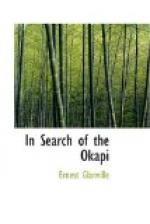“Would ye enter further?” asked the woman.
“Have ye entered further, mother?”
“Yebo, ’Ngonyama (lion).”
“Then lead on.”
“Listen, Ngonyama; listen, Indhlovu (elephant). There is a path for the lion in the veld, and another for the elephant in the forest; but this path is only for those who know it, and are welcome to those who made it. The sun shines without. It were better if Ngonyama and the Spider blinked their eyes in the light Mid the warmth.”
“If ye have trodden the way, so will we. Lead on.”
“Ye lose your wisdom, great one; but see, I go;” and she went from the cave into a vaulted passage, in which they encountered the blast laden with moisture, that made the walls slimy and the floor a series of puddles.
The way was dark, and they splashed and stumbled in growing discomfort in the footsteps of the leader, who kept on at a quick walk, showing a thorough familiarity with the passage. Sometimes, as they could tell from the sound, the roof of the passage extended to great heights; at others it closed in till they had to stoop their heads. But their guide kept on without a pause, and presently, to their great relief, they saw ahead a faint reflection of the light upon a wet slab of rock. Hurrying on, they emerged from the passage into a vast chamber, across which, though there was light enough to distinguish each other, they could not see. Mr. Hume took a step forward, with his face turned up, in an effort to see the roof through the films of vapour that floated overhead.
“Stop, Ngonyama—see to your footing;” and the woman’s hand restrained him.
He started back involuntarily, for at his feet there was a yawning abyss, out of which came the sound of rushing waters, and the curling wraiths of vapours, but so deep and so dark that the eye could detect no gleam of the flood beneath.
“Thanks, mother.”
“Ohe! Ngonyama, remember I stood between you and death that time.”
She moved away to the right, and they followed, going on a ledge which skirted the yawning abyss.
It was a perilous passage, and both of them would have been glad to turn back after they had gone a few steps, if the woman had suggested it. A feeling of vertigo seized them, so that they had to stop, leaning away from them for fear of falling over out of sheer dizziness. When they did move again, they groped for a footing with a complete feeling of helplessness, expecting every moment to slip on the slimy rock, and the further they advanced the worse they felt, for it would be as bad to turn back as go on. Looking back, Mr. Hume at one pause saw a little splatter of flame. Venning had groped for a match and struck a light; but before he could see anything by its reflection, Mr. Hume blew it out, and placed his heavy hand on the boy’s shoulders to steady him.
“Worst thing you could do,” he said.
“It’s so dark,” muttered the boy.




